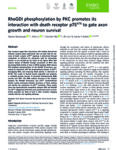Growth Factor Receptor Signaling and Biology in Nervous System and Metabolism: Neurodegeneration, Dementia and Obesity
With a focus on growth factor receptor signalling, the aim of our research is the discovery of novel biological principles and mechanisms of general importance for nervous system development and metabolic regulation.
We are currently developing the following lines of investigation:
- Death receptor signaling and physiology in neurodegeneration
Our aim in this programme is to elucidate the molecular mechanisms and physiological relevance of death-receptor signaling in the nervous system and to harness this knowledge for the development of novel treatments to neurodegenerative diseases and neurotrauma. The main focus is on the p75 neurotrophin receptor (p75NTR), a member of the Tumor Necreosis Factor Superfamily. p75NTR signaling actively contributes to neuronal and glial cell damage, axonal degeneration and synaptic dysfunction, hence there is a good rationale for inhibiting p75NTR in neural injury and neurodegeneration. However, p75NTR has been a difficult receptor to study, and the mechanisms by which p75NTR couples to downstream pathways and how they contribute to p75NTR function remain outstanding questions in the field.
- Metabolic regulation by activin receptors ALK4 and ALK7
This programme focuses on the role of a novel regulatory network, formed by members of the transforming growth factor-beta (TGF-b) superfamily and their receptors, in the control of glucose homeostasis, fat accumulation and energy balance. It is based on our original discovery of the TGF-b superfamily receptor ALK7 and our recent studies on the functions of activin signalling through ALK7 and ALK4 in pancreatic islets, adipose tissue, and hypothalamus. This program offers a new inroad to the study of metabolic regulation and involves complementary studies in cell culture as well as conditional and knock-in mouse models.
-
Control of brain microvasculature integrity and function by neurotrophin signaling
The central aim of this research is to elucidate the role of neurotrophin signaling in cerebrovascular disease, focusing on the actions of brain-derived neurotrophic factor (BDNF) and its receptors on cellular elements of the brain microvasculature, under normal conditions and following cerebrovascular damage and AD-related neurodegeneration. BDNF is one of the most important growth factors contributing to brain development, as well as neuronal and synaptic maintenance and function. Alterations in BDNF expression or function have been linked to a variety of neurological conditions.


